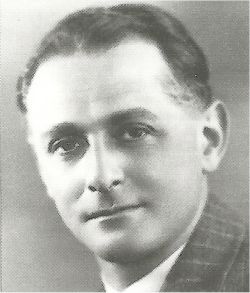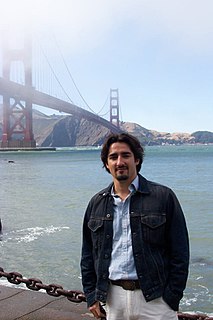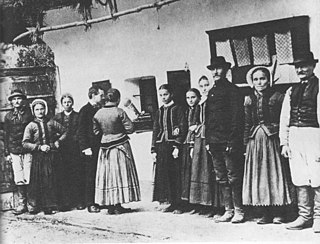A baritone is a type of classical male singing voice whose vocal range lies between the bass and the tenor voice types. Originally from the Greek βαρύτονος (barýtonos), meaning heavy sounding, music for this voice is typically written in the range from the second F below middle C to the F above middle C (i.e. F2–F4) in choral music, and from the second A below middle C to the A above middle C (A2 to A4) in operatic music, but can be extended at either end. The baritone voice type is generally divided into the baryton-Martin baritone (light baritone), lyric baritone, Kavalierbariton, Verdi baritone, dramatic baritone, baryton-noble baritone, and the bass-baritone.

Hampton is a suburban area on the north bank of the River Thames, in the London Borough of Richmond upon Thames, England, which includes Hampton Court Palace. Hampton is served by two railway stations, including one immediately south of Hampton Court Bridge in East Molesey.

Thomas Augustine Arne was an English composer. He is best known for his patriotic song Rule Britannia, a version of God Save the King, which became the British national anthem, and the song A-Hunting We Will Go. Arne was a leading British theatre composer of the 18th century, working at Drury Lane and Covent Garden.

Tito Gobbi was an Italian operatic baritone with an international reputation.

Sir Bryn Terfel Jones, is a Welsh bass-baritone opera and concert singer. Terfel was initially associated with the roles of Mozart, particularly Figaro and Don Giovanni, but has subsequently shifted his attention to heavier roles, especially those by Wagner.

Giovanni Matteo De Candia, also known as Mario, was an Italian opera singer. The most celebrated tenor of his era, he was lionized by audiences in Paris and London. He was the partner of the opera singer Giulia Grisi.

William Heddle Nash was an English lyric tenor who appeared in opera and oratorio in the middle decades of the twentieth century. He also made numerous recordings that are still available on CD reissues.
Sir Thomas Boaz Allen is an English operatic baritone. He is widely admired in the opera world for his voice, the versatility of his repertoire, and his acting—leading many to regard him as one of the best lyric baritones of the late 20th century. In October 2011, he was appointed Chancellor of Durham University, succeeding Bill Bryson.

Don Giovanni is a 1979 French-Italian film directed by Joseph Losey. It is an adaptation of Mozart's classic opera Don Giovanni, based on the Don Juan legend of a seducer, destroyed by his excesses. The film stars Ruggero Raimondi in the title role, and the conductor is Lorin Maazel. It was re-released on DVD in 2008.

Charles Castronovo is an American operatic tenor. Castronovo was born to a Sicilian father and an Ecuadorian mother in Queens, New York, but grew up in Southern California. He attended California State University, Fullerton, for undergraduate studies in classical voice. During his time at the university, his talent came to the attention of William Vendice, the chorusmaster of the Los Angeles Opera, who promptly hired him as a chorister.
Murray Dickie OBE was a Scottish tenor opera singer and director, who established his career in England, Austria and Italy during the 1950s. In addition to his extensive stage work he was a prolific recording artist.

Don Giovanni, o sia Il convitato di pietra, also known as Don Giovanni Tenorio is a one-act opera by the Italian composer Giuseppe Gazzaniga. The opera was first performed at the Teatro San Moisè, Venice, on 5 February 1787, the same day as Francesco Gardi's opera Don Giovanni in the same city at the Teatro San Samuele The libretto, by Giovanni Bertati, is based on the legend of Don Juan as told by Tirso de Molina in his play The Trickster of Seville and the Stone Guest (c. 1630), leading to comparisons with Mozart's Don Giovanni which had its premiere later in 1787. Mozart's librettist, Lorenzo Da Ponte, certainly knew the earlier opera. Gazzaniga's work is much shorter than Mozart's, and originally formed part of a double-bill with another piece, Il capriccio drammatico.

Marie Wilt was an Austrian dramatic coloratura soprano. Possessing a wide vocal range with a significant amount of power and flexibility, Wilt sang a wide repertoire that encompassed the operas of Wolfgang Amadeus Mozart, the German operas of Richard Wagner, the grand operas of Giuseppe Verdi, and the bel canto operas of Bellini, Rossini, and Donizetti. She sang for many years at the Vienna Hofoper and for a number of seasons at the Royal Opera House, Covent Garden in London. She notably portrayed the role of Sulamith in the world premiere of Karl Goldmark's Die Königin von Saba in 1875. Also a regular performer of the concert repertoire, Wilt often appeared in performances of works by Beethoven, Haydn, and Mendelssohn.
Edmond-Alphonse Vergnet was a French operatic tenor.
Richard Croft is an American opera singer who is often characterized as a lyric tenor or "Mozart tenor."
Emmanuel Christian Hedmondt was a Canadian-born tenor who made a long and distinguished career, mainly within the operatic repertoire. He changed to this stage name from his family name Hausgen. He also used the name Charles Hedmont, although spellings of this vary.

Mary Ann Paton (1802–1864) married names including Mary Ann Wood, was a Scottish vocalist.

Francisco Augusto D'Andrade, or De Andrade, was a Portuguese baritone who sang leading roles in opera houses throughout Europe, including five years as the principal baritone at the Royal Italian Opera in London and thirteen years at the Berlin Hofoper. Considered a "very elegant and cultured singer," he was particularly admired for his portrayal of the title role in Mozart's Don Giovanni. In his native city of Lisbon, D'Andrade created the role of Adaour in the 1888 world premiere of Alfredo Keil's Donna Bianca, appearing with his elder brother, the tenor António D'Andrade.
Georges Jouatte was a 20th-century French operatic singer (tenor) and singing professor.
Horst Laubenthal, real name Horst Neumaier, is a German operatic tenor and academic voice teacher. He is known internationally, both as an opera singer especially in Mozart roles such as Belmonte, Don Ottavio and Tamino, and as a concert and recital singer, with a focus on works by Johann Sebastian Bach. He has appeared at major opera houses and festivals, including the Glyndebourne Festival and the Salzburg Festival, and made many recordings, including rarely performed works such as Korngold's Violanta.






















